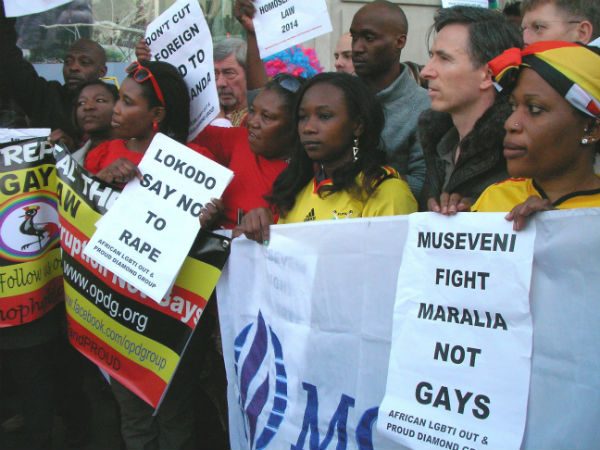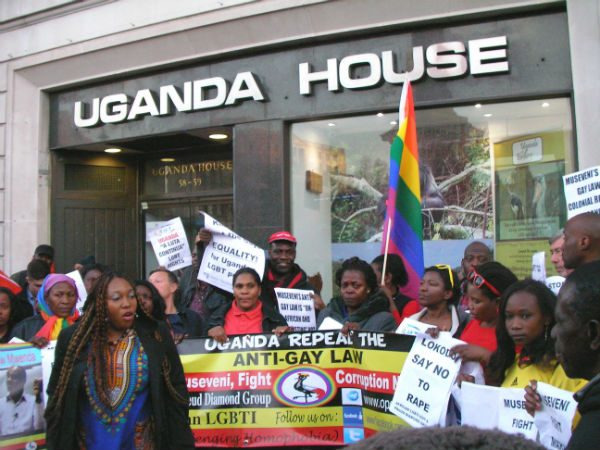African demonstrators urge their country to fight poverty, corruption, and HIV, not gays and lesbians.
Ugandan LGBTs and their allies rallied outside the Ugandan High Commission in London on 19 March, to protest the new, draconian Anti-Homosexuality Act—one of the world’s harshest anti-gay laws.
To the beat of African drummers the crowd held placards and urged President Yoweri Museveni and the Ugandan parliament to repeal all anti-gay laws. They also asked that the Ugandan media stop the anti-gay witch-hunts and blacklisting that fuel homophobic hate crimes, and that Ugandan religious leaders stand up for spiritual values and for LGBTI rights.
The protest was organized by the African LGBTI Out & Proud Diamond Group and Peter Tatchell Foundation, with the support of activists from Nigeria, the RMT union, Amnesty International and the NAZ Project.
“Homosexuality is African; homophobia isn’t. It was a colonial import to Uganda. We are urging the repeal of all Uganda’s anti-gay laws—both the new legislation and the old nineteenth century colonial-era criminalization of homosexuality. I urge the international community to continue funding aid projects in Uganda via organizations that don’t discriminate—and to work with the Ugandan people towards achieving equality for all.”
Peter Tatchell, Director of the Peter Tatchell Foundation, added, “The Anti-Homosexuality Act law violates Article 21 of the Ugandan constitution, the Commonwealth Charter and the African Charter on Human & People’s Rights, to which Uganda is a signatory. It does not even conform to the human rights checklist agreed by Ugandan parliamentarians. The law was passed by the parliament without a quorum. When he signed the law, the president justified his decision by distorting the scientific evidence about homosexuality.”
The new legislation extends the current maximum penalty of life imprisonment for anal intercourse to a mandatory life sentence for any same-sex act—even same-sex kissing and touching. Even attempts to socialize or make homosexual contact carry an automatic seven year jail term. The legislation also introduces maximum sentences of five to seven years’ imprisonment for counseling or advocating LGBT rights and funding or assisting LGBT people or events. There is also a compulsory life sentence for anyone who has a same-sex marriage and a penalty of seven years for a person who conducts such a marriage.

Richard Banadda, coordinator of the protest, said the signing of the Anti-Homosexuality Act represented “an increased crackdown on the civil liberties of the Ugandan people” and will result in “scaring away foreign investors, expatriates, tourists and aid donors. It also diverts attention from the main problems affecting Uganda, such as poverty and under-resourced medical and educational facilities.”
